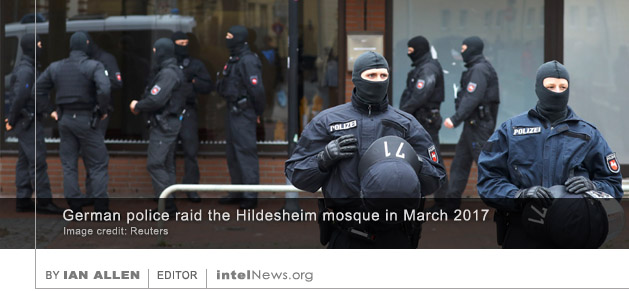Jordanian news agency claims Mossad involvement in helping alleged coup plotter
April 5, 2021 Leave a comment

A NEWS AGENCY IN Jordan has said that a man with alleged ties to Israeli intelligence offered protection to Hamzah bin Hussein, half-brother of Jordan’s King Abdullah II, who is reportedly under house arrest in Amman. Prince Hamzah is among at least 16 members of the Jordanian royal family and other senior officials, who were apparently arrested last week, with the government claiming soon afterwards that a coup to depose the country’s monarch had been averted.
Hours after his arrest, Prince Hamzah’s family leaked a video to the BBC, in which the King’s half-brother said he was under house arrest, and blamed the ruling family for corruption and for incompetence in dealing with the ongoing COVID-19 pandemic. Hamzah was Jordan’s crown prince until 2004, when he was stripped of his title by his half-brother. King Abdullah II has ruled the Hashemite Kingdom since the 1999 passing of his father, King Hussein, who ruled the country for nearly 50 years.
Hamzah claimed in the leaked video that he was being punished for participating in meetings in which Jordan’s “ruling system” had been criticized. This emerging dispute is rare in Jordan, as the royal family is extremely private and the media are strongly discouraged from reporting about internal splits and other disagreements among senior royals. This development also points to potential sources of instability in one of the Middle East’s few stable political entities. Critics claim that Jordan’s stability is an apparition that masks growing social angst amidst a state-run system of censorship.
On Sunday, Jordan’s largest news agency, Ammon, cited an “informed source” in claiming that an Israeli businessman made contact with Hamzah’s family and offered to fly them out of Jordan using a private airplane. The report also claimed that the businessman, Roy Shaposhnik, had previously been associated with Israel’s Mossad intelligence agency. Shaposhnik served as an adviser to Israel’s former Prime Minister, Ehud Olmert, but is today primarily known for his company, RS Logistical Solutions, which is contracted for services by governments around the world.
In a subsequent media interview, Shaposhnik reportedly confirmed that he had offered to help Hamzah, because he was his “close personal friend”. But he denied ever having worked for the Mossad, saying he is simply “an Israeli living in Europe. I never served in any role in the Israeli intelligence services”. On Sunday, Israel’s Minister of Defense, Benny Gantz, said that the alleged coup plot was “an internal Jordanian issue”, but added that Israel was “prepared to assist Jordan as necessary” and cited the close security ties between Israel and Jordan.
► Author: Joseph Fitsanakis | Date: 05 April 2021 | Permalink
 Authorities in Germany announced yesterday the arrest of a German national who is accused of spying on a central German mosque on behalf of Jordan, according to media reports. The man was reportedly arrested on Tuesday at an unknown location by officers of Germany’s domestic intelligence agency, the Federal Office for the Protection of the Constitution (BfV). In a press statement, the agency said the man is a 33-year-old German national named “Alexander B.”. German privacy rules forbid the public identification of crime suspects prior to their conviction in a court of law.
Authorities in Germany announced yesterday the arrest of a German national who is accused of spying on a central German mosque on behalf of Jordan, according to media reports. The man was reportedly arrested on Tuesday at an unknown location by officers of Germany’s domestic intelligence agency, the Federal Office for the Protection of the Constitution (BfV). In a press statement, the agency said the man is a 33-year-old German national named “Alexander B.”. German privacy rules forbid the public identification of crime suspects prior to their conviction in a court of law. Three United States Special Forces soldiers who were killed outside a Jordanian military base earlier this month were working for the Central Intelligence Agency, according to American government officials. The three soldiers were shot dead on November 4 by a Jordanian soldier, who was subsequently wounded in an exchange of fire, according to
Three United States Special Forces soldiers who were killed outside a Jordanian military base earlier this month were working for the Central Intelligence Agency, according to American government officials. The three soldiers were shot dead on November 4 by a Jordanian soldier, who was subsequently wounded in an exchange of fire, according to  A rare armed attack on a Jordanian intelligence agency facility has left five people dead, including three intelligence officers. The attack took place on Monday at the General Intelligence Department (GID) building in the Baqa’a refugee camp, located just north of the capital Amman. Built in 1968, Baqa’a is the largest of Jordan’s 10 government-sanctioned refugee camps, and houses 100,000 Palestinians —approximately 10 percent of the country’s 1 million-strong Palestinian population.
A rare armed attack on a Jordanian intelligence agency facility has left five people dead, including three intelligence officers. The attack took place on Monday at the General Intelligence Department (GID) building in the Baqa’a refugee camp, located just north of the capital Amman. Built in 1968, Baqa’a is the largest of Jordan’s 10 government-sanctioned refugee camps, and houses 100,000 Palestinians —approximately 10 percent of the country’s 1 million-strong Palestinian population.  The governments of Israel, Egypt and Jordan have entered an intelligence-sharing agreement aimed at joining forces against the Islamic State, which a senior Israeli military commander has described as “unprecedented”. The comment was made on Wednesday by Major General Yair Golan at a press conference hosted by Israel’s Foreign Press Association. General Golan has been serving as Deputy Chief of the General Staff of the Israel Defense Forces since late 2014.
The governments of Israel, Egypt and Jordan have entered an intelligence-sharing agreement aimed at joining forces against the Islamic State, which a senior Israeli military commander has described as “unprecedented”. The comment was made on Wednesday by Major General Yair Golan at a press conference hosted by Israel’s Foreign Press Association. General Golan has been serving as Deputy Chief of the General Staff of the Israel Defense Forces since late 2014.













Jordanian intelligence thwarted Islamic State plan to kill soldiers in Jordan, Israel
July 28, 2021 by Ian Allen Leave a comment
THE INTELLIGENCE SERVICES OF Jordan allegedly thwarted a plan by a cell of Islamic State fighters to carry out an armed attack across two countries, with the ultimate aim of killing Jordanian and Israeli troops. The state-owned Jordanian newspaper Al-Ra’I said on Tuesday that the attack was to be carried out in Gawr as-Safi, a sparsely inhabited area of the Jordan Valley, which is adjacent to the southern portion of Israel’s Dead Sea region.
The paper said that Jordan’s General Intelligence Department caught on to a suspected Islamist militant in December of 2020. The suspect led them to a larger cell of three other militants, who were arrested in February of this year. Their goal was reportedly to attack a Jordanian border post in Gawr as-Safi and kill the border guards there. They then planned to cross into Israel and open fire on Israeli soldiers, with the aim of killing them, in what appears to have been planned as a murder-suicide mission.
In the indictment of the four men, Jordanian authorities claim that they were found to be hoarding a cache of weapons, which they planned to use to carry out their attack in Jordan and Israel. They now face charges of conspiring to commit an act of terrorism and propagating the ideology of the Islamic State, which the Jordanian government designates as an international terrorist organization.
Meanwhile, a new assessment of the Islamic State by the Analytical Support and Sanctions Monitoring Team of the United Nations’ Security Council, warns that the militant organization remains strong in parts of the Middle East. The report, issued this week, recognizes that the Islamic State has suffered setbacks in recent years. But it cautions against dismissing the threat, noting that the militant group “has evolved into an entrenched insurgency” that is “exploiting weaknesses in local security to find safe havens and [is] targeting [government] forces” across the region.
► Author: Ian Allen | Date: 28 July 2021 | Permalink
Filed under Expert news and commentary on intelligence, espionage, spies and spying Tagged with Gawr as-Safi (Jordan), General Intelligence Department (Jordan), Islamic State, Israel, Jordan